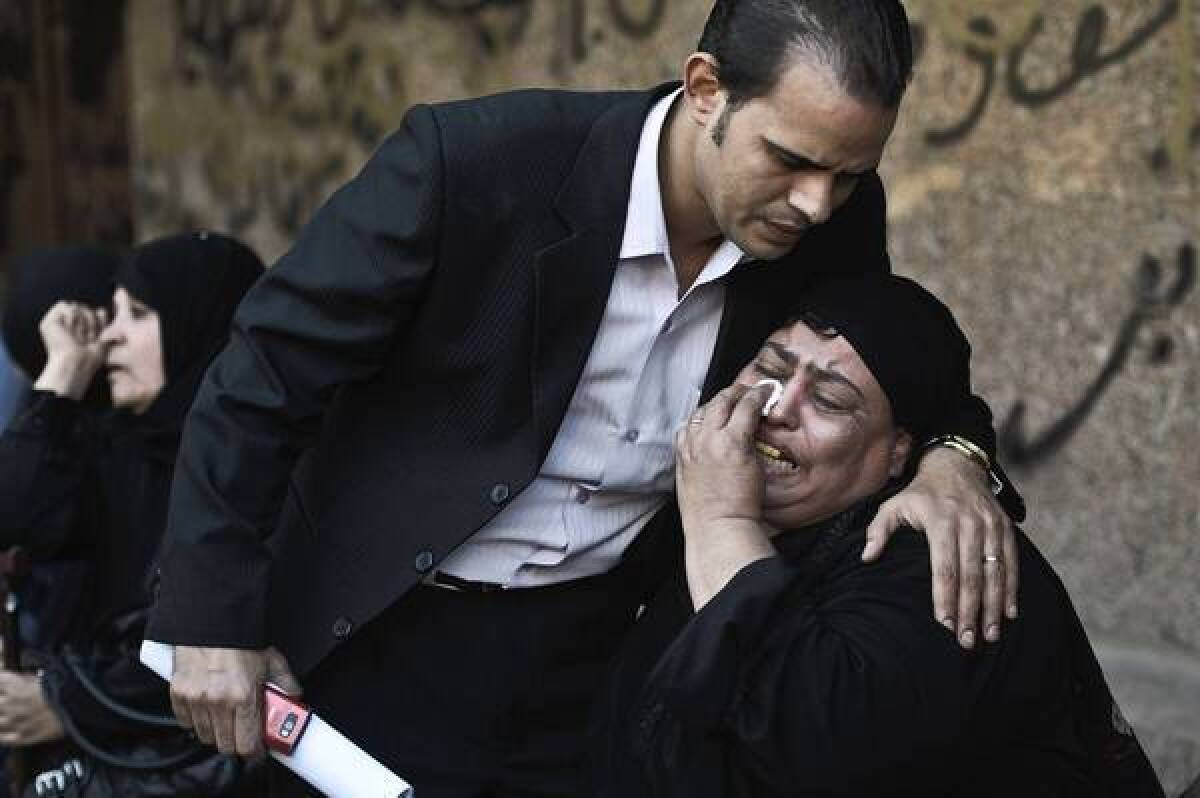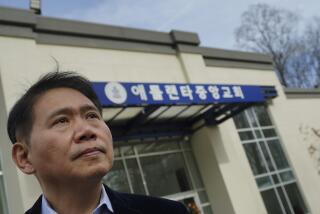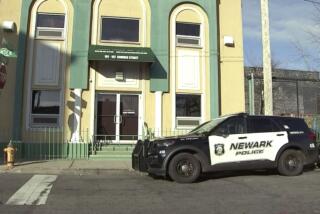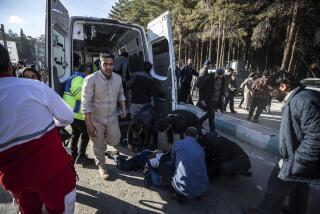Attack on wedding is latest horror for Egypt’s Coptic Christians

CAIRO — It was nearly 9 p.m., but the Church of the Virgin Mary, the heart of the Christian community in a ramshackle neighborhood on Cairo’s outskirts, was alive with activity. One elaborate Coptic wedding ritual was ending, and another was soon to begin. Relatives and friends of the couples crowded the church’s entryway, spilling onto the sidewalks of a busy street that roared with traffic night and day.
That was when the gunfire erupted.
The assailants were masked and riding motorbikes, witnesses said. In a span of seconds, they sprayed the celebrants with bullets and roared off into the night, leaving behind a welter of bleeding bodies and shrieking survivors. Four people were killed, including an 8-year-old girl, and 19 injured, authorities said, in the latest assault on Egypt’s minority Copts.
Coptic Christians, an ancient sect whose adherents have lived in Egypt for centuries, have borne the brunt of escalating violence in the wake of a tumultuous summer that saw Islamist President Mohamed Morsi deposed by the army and replaced by a military-backed interim government. After a bloody crackdown on Morsi’s followers in the Muslim Brotherhood, some sought to make scapegoats of the Christians — infuriated, in particular, when the Coptic pope, Tawadros II, appeared alongside army chief Abdel Fattah Sisi on nationwide television on July 3 to announce that Morsi had been removed from office.
In cosmopolitan Cairo, though, many Copts still felt safe, especially when they were among their own.
“We were waiting for our bride to come, and we were very happy,” said Maria Helmy Atta, rubbing her grief-swollen face as she sat surrounded by other black-clad old women in the church on Monday. The bride was her granddaughter; together with a clutch of family members, the grandmother had just alighted from a minibus at the entrance to the church when the attack began.
Atta’s 8-year-old great-granddaughter, Rasha Ashraf Magdy, dressed in wedding finery, fell mortally wounded. So did the bride’s uncle, shot in the heart. Church volunteer Emad Shawky, a lanky 19-year-old, ran outside when he heard the gunfire. “People were lying in pools of blood,” he said. The next day, stains, only partially scrubbed away, could still be seen on the patterned concrete.
No one claimed responsibility for the shooting Sunday night, which drew universal condemnation from Egypt’s polarized religious and political leadership. The interim prime minister, Hazem Beblawi, called it a “lowly criminal act” and vowed that those who carried it out would be found and punished.
Few of the mourners who crowded the church’s battered wooden pews Monday had any confidence of that happening. Some were angry at the government for failing to guard the church, and others suggested that security forces might have been complicit in the attack. Others blamed the Brotherhood, and angrily shrugged off the group’s denunciation of the shooting. Nearly all said they considered their Coptic sect, which makes up about 10% of the population and has long faced hostility and discrimination, to be a pawn in Egypt’s ongoing turmoil.
A visiting Coptic priest, Father Maximum Nemr, said both the Brotherhood and the government had used past outbreaks of violence to score political points. Christians said the police and army had failed to come to their defense in late summer when angry Morsi supporters rampaged in the Coptic heartland south of Cairo, torching churches and looting Christian-owned businesses.
“The government let us burn, so they could show the world the Brotherhood burning us,” Nemr said.
Atta, the grandmother of the arriving bride, recounted that in the chaotic moments after the attack, someone thought to call the young woman, who was at the hairdresser having the final touches put on her ornate coiffure, in readiness for the traditional Coptic marriage crown to be placed upon her head.
Don’t come, the caller said. There will be no wedding. Not tonight.
In the church vestibule, a young boy in a turquoise T-shirt let out a shattering howl of grief, burying his face in the shoulder of a man who clasped the boy’s head and tried to console him. Looking on, Father Justus Kamel, gray-bearded and tall in his black cassock, shook his head in pity.
“It’s a terrible thing, for weddings to turn to funerals,” he said.
Special correspondent Ingy Hassieb contributed to this report.
More to Read
Start your day right
Sign up for Essential California for news, features and recommendations from the L.A. Times and beyond in your inbox six days a week.
You may occasionally receive promotional content from the Los Angeles Times.






